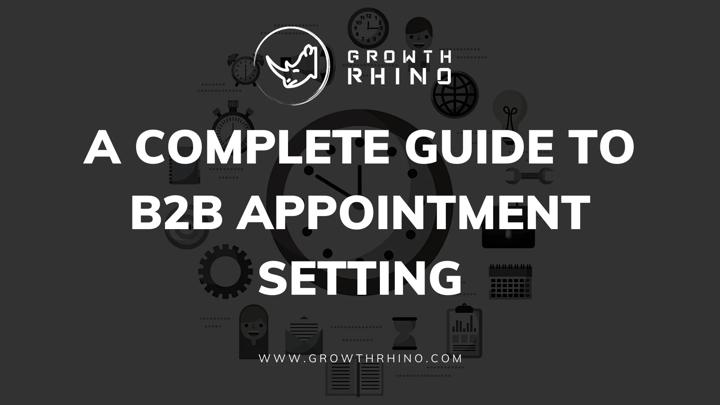
Do you want to grow your business? A lot of businesses need a strategy for B2B appointment setting in order to do so. A successful guide to B2B appointment setting strategy is one that will help you increase revenue and have more satisfied customers!
In this guide, we look at all aspects of the B2B appointment setting you should be aware of. We'll start by discussing what B2B appointment setting is and why it's important in a competitive marketplace and the benefits that come from having an effective B2B appointment setting. We'll also talk about tips for a successful guide to B2B appointment setting process. Let’s get started!
What is B2B Appointment Setting?
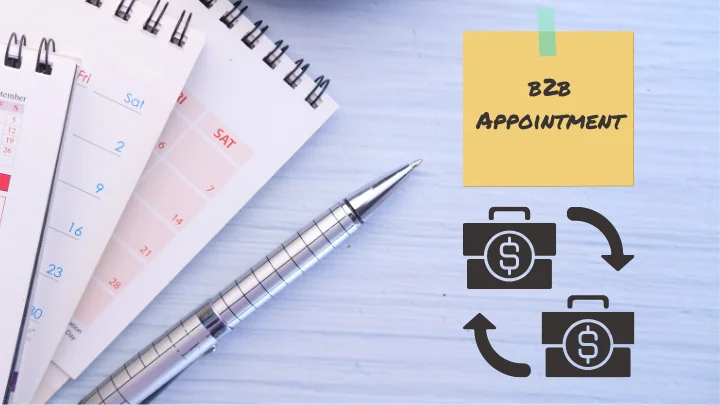
B2B appointment setting is the process of scheduling appointments with qualified leads to get them to buy your products or services. An appointment setting is a great way to increase the revenue and value your business brings to the table.
B2B appointment setting process is designed to delegate prospecting responsibility, allowing the closing salespeople (or account executives) to focus solely on qualified leads. This is especially beneficial when working with a higher sales price since those transactions need more time nurturing and completing the sales process.
What Does an Appointment Setter Do?
An appointment setter makes appointments for sales meetings and product demonstrations by contacting sales leads. Appointment setters contact cold leads, inbound marketing leads, and follow up with warm leads. Appointment setters are also responsible for determining whether the lead is a good fit for the company's products and services before moving forward with them as clients.
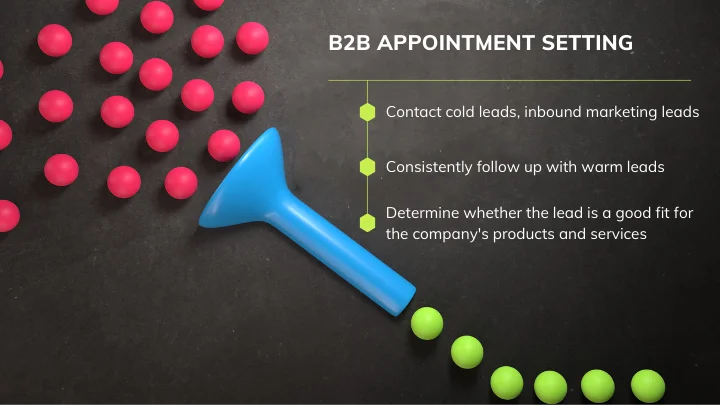
When Does Your Business Need Appointment Setting?
B2B appointment setting fits the needs of the sales team more than others. Two signs that your company could benefit from the B2B appointment setting process include:
1. You deal in Premium Products/Services:
If you sell high-ticket products/services or focus on large deals, it can be difficult to close a sale. You need to convince the decision-makers. One way is by having an account-based sales strategy (ABS).
This involves identifying those key stakeholders or key decision-makers and persistently following up with the lead until they are ready for a sales conversation. It will make it easier for your salespeople to close a deal.
2) Your business is experiencing long sales cycles:
A long sales cycle is the unavoidable consequence of a high-involvement B2B purchase. The appointment setting allows closing reps to focus exclusively on the qualified prospect who has already expressed an interest in purchasing your product, shortening the sales cycle.
Yes, it can take a long time to sell something in the B2B market. But you can make the process shorter by only meeting with qualified people who are already looking for your product.
3) Your business has to demonstrate research:
In a B2B selling scenario, you will always have to present research and evidence of your product's success.
Before approaching the decision-maker, be prepared and well-versed in the firm's operations. Make certain you give yourself a good chance by putting your best foot forward. If their company receives a lot of phone inquiries, it's essential that you make yourself heard. Highlight how your product or service can be used as a solution to the problems that their business is facing.
What Are the Benefits of Appointment Setting?
B2B appointment setting allows firms to improve their sales pipeline in a variety of ways:
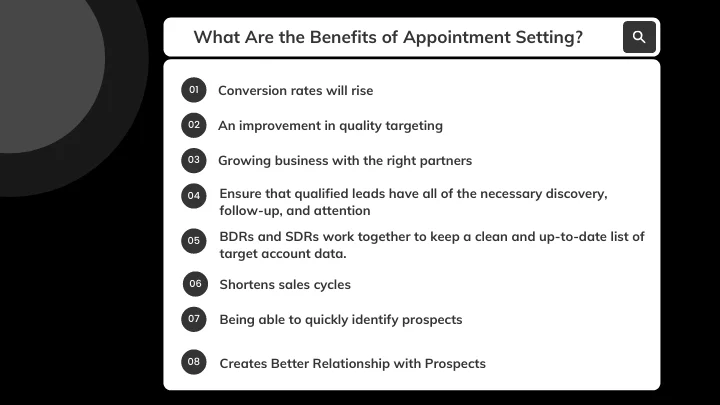
1) Conversion rates will rise:
All sales processes need nurturing, but information gathering is crucial as well. These must be handled together to successfully influence your potential customers. You may use the knowledge gathered about your clients and nurture their interest accordingly until they make a purchase using an appointment setting.
2) An improvement in quality targeting:
You'll be able to reach out to a wider range of prospects. The sales process is lengthy and complicated, especially when doing lead generation or looking for the best leads to target. But with the aid of the appointment setting method, you'll have the opportunity you need—direct to the decision-makers.
3) Growing business with the right partners:
Handling B2B appointments in-house can be possible, but the challenges and barriers to success will be aplenty. Many companies choose to outsource their B2B appointment setting needs, as this helps them not only reduce expenses but also have access to an already capable team.
There will be no need to train new members, purchase new equipment and platforms, and even deal with turnover rates. You have the golden opportunity to focus on what matters most—enhancing your products, sales development, and growing your business—if you engage with a professional already on hand.
4) Ensure that qualified leads have all of the necessary discovery, follow-up, and attention.
5) BDRs and SDRs work together to keep a clean and up-to-date list of target account data.
6) Shortens sales cycles:
It shortens the sales process especially for major transactions with complicated purchasing procedures.
7) Being able to quickly identify prospects:
Account executives may maximize their chances of closing business deals by having the ability to quickly identify prospects who are more likely to buy.
8) Creates Better Relationship with Prospects:
A well-run appointment setting campaign can also help sales teams create better relationships with prospects and clients by delivering the highest quality information at their fingertips.
Tips and Guide To B2B Appointment Setting:
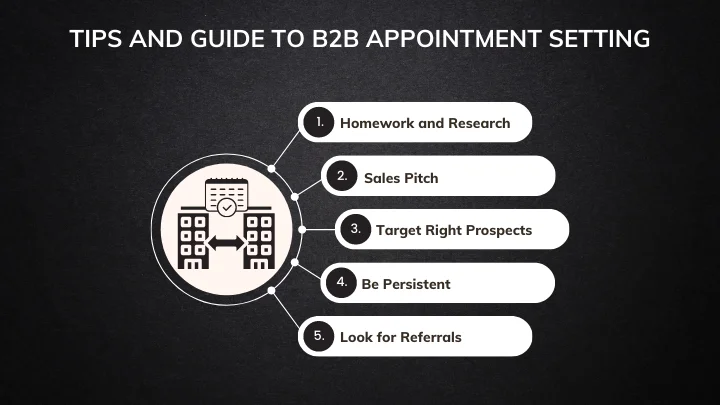
1) Homework and Research:
It is critical to plan ahead of time for your appointments. You need to understand your prospect in order to know what to say. Cold calling isn't the most pleasant aspect of many salespeople's jobs; mostly because they have to deal with a variety of personalities and frequently receive a rejection. The goal is to act as if you are an experienced professional who truly believes in what you are saying.
Learn as much as you can about the prospect's company ahead of time. This will assist you in anticipating their worries and questions.
2) Sales Pitch:
A sales pitch is your moment to shine. The reason you are on the phone in the first place is that someone told them about you and they agreed to a short talk with you. A good way to prepare for this call, especially if it's a cold calling, is to write down what points from the initial research you want to bring up.
A good sales pitch is not only informative but should be customized to the prospect's needs. A complete understanding of what they are looking for will enable you to sell your product or service more effectively and efficiently.
Don't forget that this is a two-way conversation, meaning listen carefully and actively engage with them on what their concerns are as well. A good way to do this is to ask questions. However, you must act naturally and maintain a conversational tone rather than sounding like a robot. This will make the discussion more interesting.
Know your scripts. Don't be pushy. Use persuasion (but not aggressiveness) and always maintain a polite demeanor. If you come on too strong, the prospect will most likely run away from you. Inquire about things and pay attention to what they're saying in order to show your interest. Always take notes and repeat key points so that you don't forget. Leave a good impression on the qualified leads so they will look forward to your next meeting.
3) Target Right Prospects:
You could have the greatest salespeople in the world working on business appointment scheduling. But if you target the wrong prospects, your campaign will fail.
Before you do your appointment setting campaign, think about what kind of business you want to approach. What size and what type? And which level of decision-makers will you talk to?
Make a list of your potential clients and do some research to figure out who they are. Make a good contact list with the appropriate individuals and phone numbers so you don't end up wasting time.
4) Be Persistent:
The appointment setting procedure takes time. Sellers in a B2B scenario don't typically have access to an infinite prospect pool. As a result, you'll need to be persistent in your efforts to contact them once you've determined your targets.
It may take a few tries for the person to answer. This is especially true in very competitive markets. People are busy and they have a lot of offers. Try different ways to contact them, like by calling, sending an email, or leaving a voice message so they can agree to meet with you.
You will want to contact your prospects every couple of months. Markets change, and they might need something else that you have. If they say no, then in a few months they may be interested in what you have to offer.
5) Look for Referrals:
When it comes to making B2B appointments, referrals are crucial. This is because individuals tend to pass their trust on to the person referred by them. They believe they already know you, giving you a significant edge. It's unquestionably preferable to attempting to contact a complete stranger for the first time.
You may receive referrals from your network of coworkers, business contacts, and friends. But you may also take advantage of any connections you have with a prospect's company.
It doesn't have to be a high-ranking executive. It can be useful if they have the decision maker's ear, even if it isn't someone high up in the corporate ladder.
